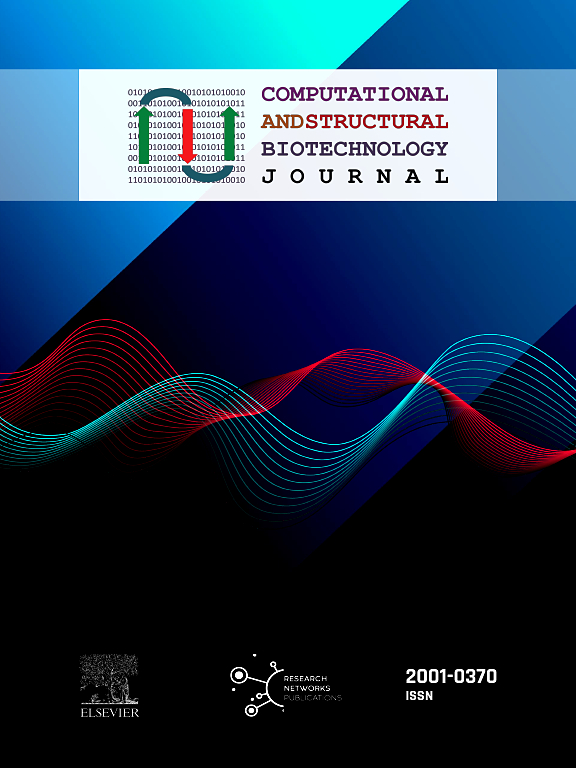整合基于人口的生物库:精准健康进步的催化剂
IF 4.1
2区 生物学
Q2 BIOCHEMISTRY & MOLECULAR BIOLOGY
Computational and structural biotechnology journal
Pub Date : 2024-11-05
DOI:10.1016/j.csbj.2024.10.049
引用次数: 0
摘要
精准医疗超越了精准医学的范畴,涉及更广泛的活动,包括疾病的预测、预防、治疗和管理。精准医疗针对特定人群,考虑遗传学、生活方式行为、健康的社会决定因素和环境因素,提供个性化的治疗和预防措施。精准医疗侧重于疾病的个性化治疗,而精准健康则旨在利用大数据和高级分析等工具在人群层面预测健康风险和预防疾病,从而促进健康和预防疾病。生物库在实现精准健康方面发挥着至关重要的作用,因为它们为疾病预测、诊断和治疗提供了特征明确的生物样本和相关数据。整合不同生物库所面临的挑战包括数据格式一致性、隐私问题和法律限制。标准化方法和数字化可以减轻这些挑战。整合生物库有助于对多个数据集进行综合分析,从而实现各种研究目标。本研究提出了应对这些挑战的策略,包括利用数字化和区块链技术为基于人群的生物库开发动态同意机制。本研究提出以下建议:1)整合基于人口的生物库;2)为人类生物库引入动态同意工具;3)利用具有动态同意机制的大型人类生物库开展不同疾病的研究。这些建议可提高生物库在实现精准健康方面的效用。桃园天生医院实施的一项案例研究证明了这些建议在实现精准健康和提高生物库价值方面的有效性。本研究通过对精准健康和生物库的全面考察,为精准医疗领域的研究人员、医疗保健专业人员和政策制定者提供了宝贵的见解。本文章由计算机程序翻译,如有差异,请以英文原文为准。
Integrating population-based biobanks: Catalyst for advances in precision health
Precision health extends beyond the scope of precision medicine and involves a broader range of activities, including the prediction, prevention, treatment, and management of diseases. Tailored to specific populations, precision health offers personalized treatment and preventive measures considering genetics, lifestyle behaviors, social determinants of health, and environmental factors. Precision medicine focuses on the personalized treatment of diseases, whereas precision health aims to promote health and prevent diseases using tools such as big data and advanced analytics to predict health risks and prevent diseases at the population level. Biobanks play a crucial role in achieving precision health because they provide well-characterized biological samples and related data for disease prediction, diagnosis, and treatment. Challenges in integrating different biobanks include data format consistency, privacy concerns, and legal constraints. Standardized methodologies and digitalization can mitigate these challenges. The integration of biobanks can facilitate comprehensive analyses across multiple datasets to achieve various research goals. This study proposes strategies to address these challenges, including the development of a dynamic consent mechanism for population-based biobanks using digitalization and blockchain technology. This study recommends the following: 1) integrating population-based biobanks, 2) introducing dynamic consent tools for human biobanks, and 3) using large human biobanks with dynamic consent for research on diverse diseases. These recommendations can increase the utility of biobanks in realizing precision health. A case study implemented at Taoyuan Tiansheng Hospital demonstrated the effectiveness of these recommendations for achieving precision health and enhancing the value of biobanks. Through a comprehensive examination of precision health and biobanks, this study provides valuable insights for researchers, healthcare professionals, and policymakers in the precision healthcare sector.
求助全文
通过发布文献求助,成功后即可免费获取论文全文。
去求助
来源期刊

Computational and structural biotechnology journal
Biochemistry, Genetics and Molecular Biology-Biophysics
CiteScore
9.30
自引率
3.30%
发文量
540
审稿时长
6 weeks
期刊介绍:
Computational and Structural Biotechnology Journal (CSBJ) is an online gold open access journal publishing research articles and reviews after full peer review. All articles are published, without barriers to access, immediately upon acceptance. The journal places a strong emphasis on functional and mechanistic understanding of how molecular components in a biological process work together through the application of computational methods. Structural data may provide such insights, but they are not a pre-requisite for publication in the journal. Specific areas of interest include, but are not limited to:
Structure and function of proteins, nucleic acids and other macromolecules
Structure and function of multi-component complexes
Protein folding, processing and degradation
Enzymology
Computational and structural studies of plant systems
Microbial Informatics
Genomics
Proteomics
Metabolomics
Algorithms and Hypothesis in Bioinformatics
Mathematical and Theoretical Biology
Computational Chemistry and Drug Discovery
Microscopy and Molecular Imaging
Nanotechnology
Systems and Synthetic Biology
 求助内容:
求助内容: 应助结果提醒方式:
应助结果提醒方式:


